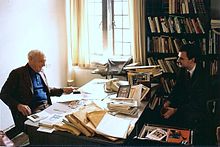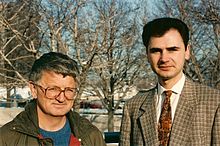- Dejan Stojanović
-
For other uses, see Dejan Stojanović (disambiguation).
Dejan Stojanović 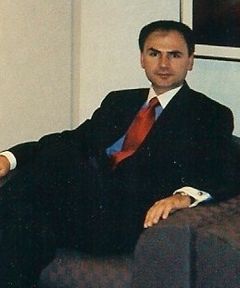
Dejan Stojanović, Chicago, 2003Born 11 March 1959
Peć, YugoslaviaOccupation Writer Nationality Serbian Dejan Stojanović (Serbian: Дејан Стојановић, pronounced [ˈdɛjan ˈstɔjanɔvitɕ]; born 11 March 1959) is a Serbian-American poet, writer, essayist, philosopher, businessman, and former journalist. His poetry is characterized by a recognizable system of thought[1] and poetic devices, bordering on philosophy, and, overall, it has a highly reflective tone.[2] According to the critic Petar V. Arbutina, “Stojanović belongs to the small and autochthonous circle of poets who have been the main creative and artistic force of the Serbian poetry in the last several decades."[3]
Contents
Biography
Family
About two centuries ago, ancestors of the Stojanovic[4] family moved from Čevo[5] (near Cetinje, Montenegro) to Orasi[6] (Lješanska Nahija, Crna Gora). According to the oral tradition, they descended from one of the most famous Serbian noblemen, Strahinjić Ban (Strahinja Banović, Banović Strahinja). Some members of the original family moved to Kosovo in the early 1930s.
Stojanović’s paternal grandmother, Anđa, was from a distinguished Montenegrin family, the Lubarda family, of which the most prominent member was Petar Lubarda, arguably the best and most celebrated painter of the former Yugoslavia (about whom Sir Herbert Read wrote with delight).
Early years
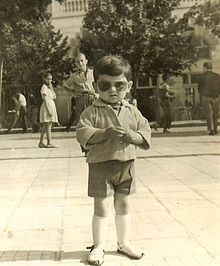 Dejan Stojanović, Peć, August 1961
Dejan Stojanović, Peć, August 1961
Stojanović was born in Peć, Kosovo (the former Yugoslavia), which is the administrative and cultural center of Metohija, where the Patriarchate of Peć is located. Having grown up in a socialist country and in a multi-ethnic community of Kosovo, he encountered all the paradoxes of communism in the former Yugoslavia at a very early age.
In 1972, he moved with his family to Sutomore (a small town on the Adriatic Coast, near Bar, Montenegro) and he completed the school year there. Even after he moved back to Peć, every year, he spent long summer vacations with his family in their summer home in Sutomore and frequently visited the neighboring towns of Bar, Petrovac, St. Stefan, Budva, Kotor, Tivat, and Herceg Novi.
The overwhelming presence of water and the sea in his poetry probably can be explained by the fact that he lived in close proximity to the Adriatic Sea. Further, when he moved to Chicago, he was fascinated by Lake Michigan, which is more than twice the size of the Adriatic Sea. In addition, the mountains of both Montenegro and Peć (Prokletije) also influenced his poetry as evidenced by the fact that they became the other reoccurring theme in his works.
His first urges, which endured throughout his lifetime, were toward philosophy. By the age of 14, he became interested in acting and directing. Shy by nature, he never told anyone of his secret interests but was sure he would be able to explore them one day. He watched at least one movie, and sometimes two or three, every day.
In 1976, he visited Paris, and, during that visit, a Serbian political émigré, Jovan Brkić, promised to arrange admission to the Sorbonne for him. Unfortunately, he did not pursue this opportunity, and he later regretted that decision.
Adulthood
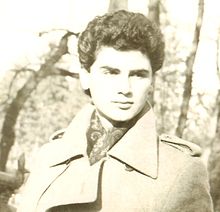 Dejan Stojanović, Belgrade, 1981
Dejan Stojanović, Belgrade, 1981
Although Stojanović was interested predominantly in philosophy and the arts, he studied law and obtained a degree from the University of Priština in Kosovo. He planned to pursue his other interests later.
His first urges to write were apparent even at the age of 10, but began to write poetry at the age of 18. He always knew he would be an author, although he expected that it would be in the domain of philosophy rather than literature because he already had established a set of elaborate philosophical ideas very early in his life.
In early 1978, he began to write poetry, and there is some evidence that, most likely, he was motivated by the intense infatuation he felt toward a girl who lived in the same town. He woke up one morning with a short, but complete, poem on his mind. The same thing happened a few days later, and it happened a third time after another few days passed. He viewed this experience as a definite sign that he should write poetry, which he did, but he hid his work for three to four years.
After this period of secrecy, he began to express his poetry more openly, and he published his poems in some of the most important literary magazines in the former Yugoslavia, such as Oko (The Eye) in Zagreb, Croatia, Jedinstvo[7] (Unity), and Stremljenja (Trends) in Priština. In 1982 or 1983, he became the secretary of a Literary Club (Karagač) in his hometown of Peć, and, later, he became the president of the Club. He was offered the opportunity to be the editor-in-chief of the local radio station in Peć, but he refused; however, he conducted several interviews with some eminent artists from Kosovo. His first book of poetry, Circling (Krugovanje), was ready for publication in 1983, but it was not published until 1993. By that time, some of the older poems had been removed and some new poems, written between 1983 and 1986, were included, along with the last poem in the book, which was written in Chicago in 1991. In 1986, as a young writer, he was recognized among 200 writers at the Bor (Serbia, former Yugoslavia) Literary Festival.[8] In the late 1980s, he became a Board member of the Literary Youth of Serbia.
In 1990, he established his private company in Peć and planned, among other things, to enter the publishing business. He named his company Metoh (the church’s land) and planned to publish a literary magazine with the same name. Even though he planned to publish the magazine in Kosovo, the staff consisted of writers from Belgrade, one of whom was Alek Vukadinović, a famous Serbian poet who was an avid supporter of Stojanović’s idea of publishing the magazine.
In the last few years, he has started writing in English, and he has already written several books, not yet published, as well as some purely philosophical writings. Many of his new poems are less elliptical and rigid from both linguistic and poetic perspectives.
Journalism
In early 1990, Stojanović started writing for the first opposition magazine in Serbia, Pogledi (Views). He interviewed[9] many prominent Serbian writers in Belgrade, e.g., Momo Kapor, Alek Vukadinović, and Nikola Milošević (politician). During his second visit to Paris in May and June 1990, he interviewed[10] several internationally-recognized artists, e.g., Ljuba Popović, Petar Omčikus, and Miloš Šobajić, who were of Serbian origin, as well as some French intellectuals, e.g., Jacques Claude Villard.
In December 1990, he went to the U.S. as a foreign correspondent, planning to stay six months to a year. The goal was to conduct interviews with some important literary figures and then return to Yugoslavia. He accomplished this goal, although not fully, because the war started in the former Yugoslavia in the middle of 1991.
He received the prestigious Rastko Petrović Award from the Society of Serbian Writers for his book of interviews[11] from 1990 to1992 in Europe and Americas, entitled Conversations, which included interviews with several major American writers, including Nobel Laureate Saul Bellow, Charles Simic, and Steve Tesich.
Lost library and manuscripts
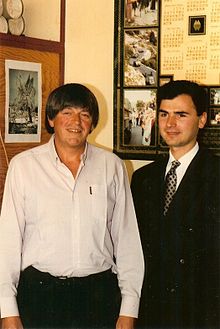 Nicholas, Prince of Montenegro (Prince Nicholas Petrović Njegoš) with Dejan Stojanović (right), Paris, May 1990
Nicholas, Prince of Montenegro (Prince Nicholas Petrović Njegoš) with Dejan Stojanović (right), Paris, May 1990
In his early adulthood, Stojanović developed a philosophical system of ideas that dealt primarily with metaphysical questions and the structure of the Universe. He wrote several hundred pages in his notebooks exploring these ideas, along with essays on language and literature. Unfortunately, these manuscripts, along with his library of more than a thousand books (carefully chosen for years), were lost due to fire caused by militant ethnic Albanians right after the war in Kosovo (1999) ended.[12] His books, along with his manuscripts, were held temporarily in his brother’s office in the center of downtown Peć.
Style
Stojanović’s poetry collections are characterized by sequences of compact, dense poems, simple yet complex in carefully organized overall structure, and that is why some more visibly than others appear as long poems. This is especially characteristic of the books, The Sign and its Children,[13] The Shape,[14] and The Creator[15] (Znak I njegova deca,[16] Oblik, Tvoritelj), in which, with a relatively small number of words repeated in different contexts, Stojanović built his own poetic cosmogony. For that reason, writer and critic, David Kecman, described him as a cosmosophist.[17]
In his poems, he covers the smallest and the largest topics with equal attention, often juxtaposing them to the level of paradox and absurdity, gradually building new perspectives and meanings that are not only poetic either in origin or in purpose. Some themes and preoccupations, be they stones or galaxies, are present in all of his books, and it can be said that his poetry books are, in themselves, long poems and that all of them serve as ingredients of a hyper-poetry book that is still in the making.
He used many poetic forms never used before in Serbian poetry and also created some new forms. “If elegance is represented by simplicity, then these are some of the most elegant verses imaginable,"[18] Branko Mikasinovich stated.
Selected works
Poems
- A Man and the Sea
- A Man with a Guitar
- A New Friend
- A Night Worth a Life
- A Star Deep in the Mind
- A Woman in the Garden of Light
- Afterlife Light
- All Women in One
- Amateurs
- An Island in the mind
- Ancient Roman Villa
- Beauty Never Dies
- Before and After
- Being Late
- Big Dreams
- Big Miniature
- Birthplace
- Break Up
- Bright Moments
- Chance
- Children of Hope
- Dancing of Sounds
- Death
- Dictionary of Sounds
- Don Juan
- Don Quixote
- Dream within the dream in the Dream of Edgar Allan Poe
- Early Morning
- Early Retirement
- Echo
- Emily Dickinson
- Emissaries
- End of the Labyrinth
- Eternal Father
- Evening by the Lake
- Fairy Tale
- Faith
- Fertile Ground
- First Love
- Flower
- Flying and Meditation
- Forgotten Home
- Forgotten Sounds
- Future Man
- Ghazal of Love
- Home
- I remember the Snows in the Summer’s Light
- I Smell You Everywhere
- Imperfection
- In a Little World
- In the Heart of the Night
- Inner Space
- Inside and Outside the Balloon
- It Is So Simple
- Feelings and Thoughts
- Knowledge
- Life Is Everywhere
- Life Is Poetry
- Love in Arizona
- Lover
- Mastery
- Memory and Oblivion
- Morning
- Mountains and Seas
- Muse I
- Muse II
- My Life
- My Other Self
- Nowhere
- Old and New
- One World
- Path
- People
- Perfect Boredom
- Poetry and Life
- Poetry and Women
- Possibility
- Rain
- Reality
- Robert Frost
- Sadness and Happiness
- Seagull from Afar
- Serious Business
- She Is the Spring in You
- She Was Always There
- Silence Is the Universal Library
- Silent Equality
- Simplicity
- Siren
- Song in the Garden
- Song of Elysium
- Song of Light
- Song of the Dream
- Song within a Song
- Sound Bombs
- Sounds of Imagination
- Sounds of Life and Love
- Sounds of Love and Hate
- Special Feeling
- Star
- Staying Crazy
- Stupidity
- Task of a Poet
- The Art of Love
- The Book of Books
- The Kiss of Light and Darkness
- The Land Beyond
- The Light from the Mind
- The New Sun and the New Moon
- The Return
- The Rise of a Barbarian
- The Sea and the World
- The Source
- The Strange Love Song of T. S. Eliot
- Two Stars
- Understanding
- Unending Life
- Unpretentious Dreams
- Unusual Love
- Wallace Stevens
- Walt Whitman
- Who Killed the Beauty?
- William Butler Yeats
- Wonder
- Words and Beauty
- Words and Life
- You are the Star
- You are What You See
Poetry collections
- Krugovanje: 1978–1987 (Circling), (Narodna knjiga, Alfa, Beograd, 1993)
- Krugovanje: 1978–1987 (Circling), Second Edition, (Narodna knjiga, Alfa, Beograd, 1998)
- Sunce sebe gleda (The Sun Watches Itself), (Književna reč, Beograd, 1999)
- Znak i njegova deca (The Sign and its Children), (Prosveta, Beograd, 2000)
- Oblik (The Shape), (Gramatik, Podgorica, 2000)
- Tvoritelj (The Creator), (Narodna knjiga, Alfa, Beograd, 2000)
- Krugovanje (Circling), Third Edition, (Narodna knjiga, Alfa, Beograd, 2000)
- Ples vremena (Dance of Time), (Konras, Beograd, 2007)
Interviews
- Razgovori (Conversations), (Književna reč, Beograd, 1999)
References
Citations
- ^ Miloslav Šutić, Significant Achievements of the Short Poetic Form, 2001 (Književna reč, broj 515, jul 2001, Beograd; Odzivi, str. 67, Konras, biblioteka Groš, 2002, Beograd)
- ^ Alek Vukadinović, Poetic Circles of Dejan Stojanović, Circling, Afterword, p. 69, 1993, Belgrade (Pesnički krugovi Dejana Stojanovića, Krugovanje, Pogovor, str. 69)
- ^ Petar V. Arbutina, The Solar Circles of Truth, 1999 (Sunce sebe gleda, Solarni krug istine [Afterword], Književna reč, Beograd)
- ^ Jovan Erdeljanović, Stara Crna Gora: etnička prošlost i formiranje crnogorskih plemena, Beograd : Slovo ljubve, 1978.
- ^ List of places in Montenegro, Cetinje
- ^ List of places in Montenegro, Podgorica
- ^ Serbian daily newspaper, Priština, Kosovo, former Yugoslavia
- ^ Zoran Mišić, Pogledi, broj 159, avgust 1994, Kragujevac
- ^ Aleksandar Petrov, A Poet before the Open Door, December 2000 (Pesnik pred otvorenim vratima, Amerikanski Srbobran, Književni dodatak)
- ^ Aleksandar I. Popović, Razgovori, Conversations, (Book jacket, 1999)
- ^ Dušan Vidaković, The Art of Interviewing (Umetnost intervjuisanja, Zbilja, broj 62/63, novembar/decembar 2000.)
- ^ D. S., Ples vremena, Napomene u vezi s knjigom prvom, str. 113, Konras, Beograd, 2007 (D. S., Dance of Time, Notes, p. 113)
- ^ Miroslav Mirković Buca, Prkos tamnim silama, Ilustrovana politika, rubrika Čitati ili ne čitati, broj 2177, 7. X 2000.
- ^ Draginja Urošević, Borba, 2001,Beograd
- ^ Oliver Janković, Belina sveta i papira, Borba, 28, 29, 30. 11. 2000, Beograd
- ^ Nevena Vitošević, Knjizevna reč, broj 513, februar 2001, Beograd
- ^ David Kecman Dako, Znakovi smisla, Borba, 15. 3. 2001, Beograd
- ^ Branko Mikasinovich, WLT World Literature Today, A Literary Quarterly of the University of Oklahoma, Norman, Oklahoma, Volume 74, Number 2, Page 442, Spring 2000
Bibliography
- Branko Mikasinovich, The Sun Watches Itself (Sunce sebe gleda), WLT, World Literature Today, A Literary Quarterly of the University of Oklahoma, Norman, Oklahoma, Volume 74, Number 2, Page 442, Spring 2000
- Miloslav Šutić, Significant Achievements of the Short Poetic Form, 2001 (Značajni dometi kratke lirske forme, Književna reč, broj 515, jul 2001.; Odzivi, str. 67, Konras, biblioteka Groš, 2002, Beograd)
- Alek Vukadinović, Poetic Circles of Dejan Stojanović, Circling, Afterword, p. 69, 1993, Belgrade (Pesnički krugovi Dejana Stojanovića, Krugovanje, Pogovor)
- Petar V. Arbutina, The Solar Circles of Truth, 1999 (Sunce sebe gleda, Solarni krug istine [Afterword], Književna reč, Beograd)
- Miroslav Mirković Buca, Prkos tamnim silama, Ilustrovana politika, rubrika Čitati ili ne čitati, broj 2177, 7. X 2000, Beograd
- Aleksandar Petrov, A Poet before the Open Door, American Srbobran, December 2000 (Pesnik pred otvorenim vratima, Amerikanski Srbobran, Književni dodatak), Pittsburgh
- Petar Arbutina, Znak i njegova deca, (Circling), back cover, 2000, Beograd
- David Kecman Dako, Znakovi smisla, Borba, 15. 3. 2001, Beograd
- Oliver Janković, Belina sveta i papira, Borba, 28, 29, 30. 11. 2000, Beograd
- Nevena Vitošević, Simfonija znakova ili skladna porodica, Knjizevna reč, broj 513, str. 49, februar 2001, Beograd
- Zoran Mišić, Pogledi, broj 159, avgust 1994, Kragujevac
- Dušan Vidaković, The Art of Interviewing (Umetnost intervjuisanja, Zbilja, broj 62/63, novembar/decembar 2000.)
- Dušan Vidaković, Slabiji sastav dijaspore, an interview with Dejan Stojanović, Blic, rubrika Kultura, str. 15, 16. septembar 1999. broj 947, Beograd
- Dušan Vidaković, Tužan svet plutokratije, robota i klovnova, an interview with Dejan Stojanović, Nedeljni dnevnik, rubrika Kultura, str. 29, godina IV, broj 153, 14 Januar 2000, Novi Sad, Vojvodina
- Z. R., Četiri naša pisca, Politika, rubrika Kulturni život, 8 decembar 2000, Beograd
- R. Popović, Novo u knjižarskim izlozima, Pogled sa visine (Razgovori), Politika, 24. januar 2000, Beograd
- R. Popović, Novo u knjižarskim izlozima, Ovako je bilo (Sunce sebe gleda), Politika, 17. januar 2000, Beograd
- Dragan Bogutović, Pesme simboli, Sedam knjiga (Kultura, književnost, pozorište, film), Večernje novosti, str. 10, 15. Avgust 1999, Beograd
- Zorica Novaković, Pitanja i nedoumice, Svet knjige, Borba (newspaper), 30. Mart 2000, Beograd
- Dušan Cicvara, Snovi iz dijaspore (Sunce sebe gleda), Beogradske novine, 17. septembar, 1999, Beograd
External links
- Dejan Stojanović at the Open Library (Open Library)
- Dejan Stojanović at the Internet Archive (Internet Archive)
- Dejan Stojanović at Poem Hunter
- World Cat (WorldCat catalog)
- Poems by Dejan Stojanović
- Poetry in English by Dejan Stojanović
- Poetry in French by Dejan Stojanović
- Poetry in Serbian by Dejan Stojanović
- Reflections with Saul Bellow by Dejan Stojanović
- Interview with Charles Simic by Dejan Stojanović
- A Few Moments with Steve Tesich by Dejan Stojanović
- Research Gate (ResearchGate)
Categories:- 1959 births
- Living people
- Serbian poets
- American people of Serbian descent
- Serbian writers
- Serbian journalists
- Serbian emigrants to the United States
- Kosovar Serbs
- Serbs of Montenegro
- Montenegrin writers
- Montenegrin poets
- Writers from Chicago, Illinois
- People from Chicago, Illinois
- American poets
- American writers
- European writers
Wikimedia Foundation. 2010.

